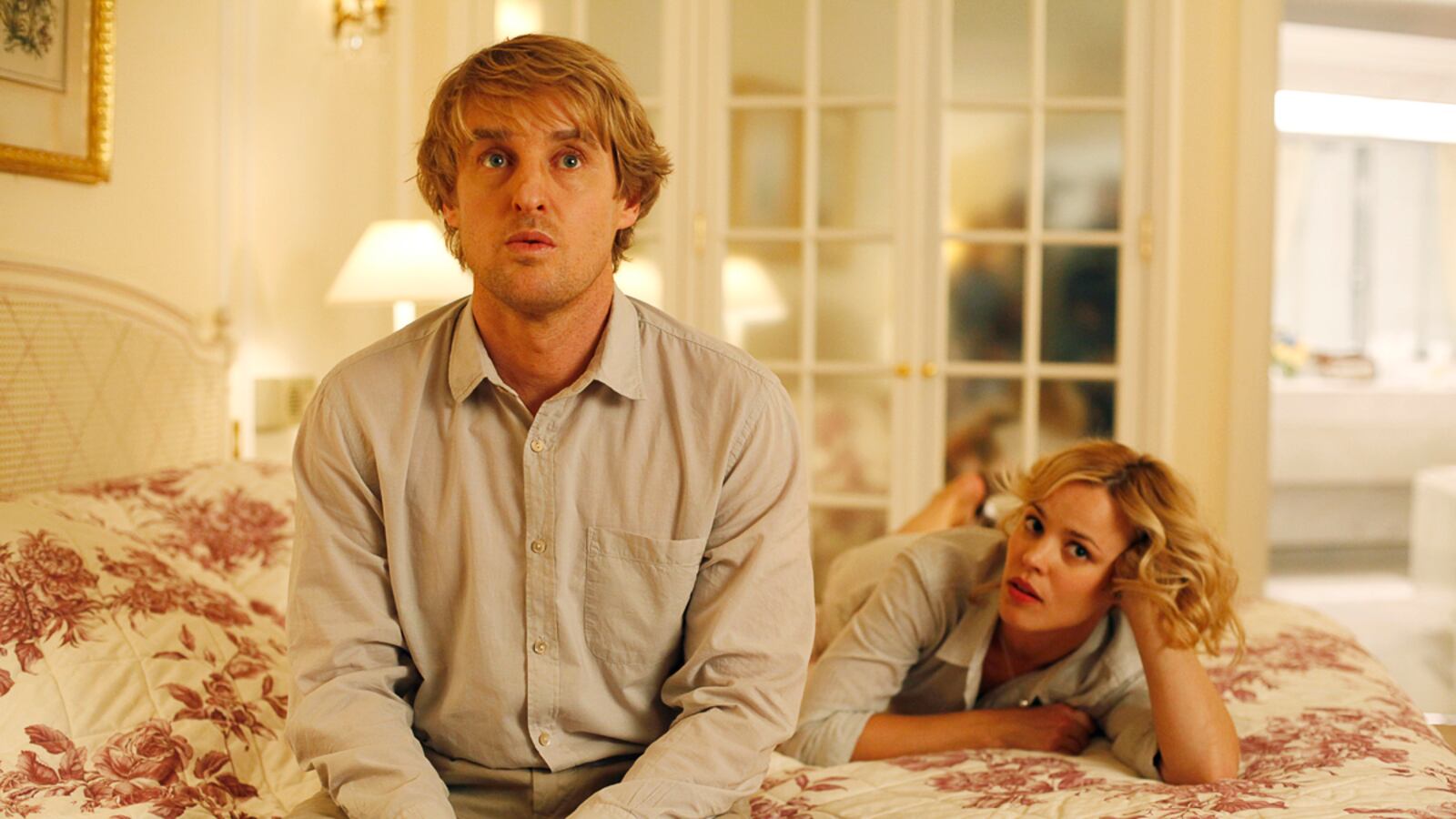After years of flirting with its darker side, Oscar has gone warm and fluffy again, in what has shaped up as the Academy of Motion Pictures Arts and Sciences Year of The Feel Good. There are no gritty Hurt Lockers in the hunt for this year’s trophy, as the Best Picture category overflows with crowd-pleasing, family-oriented, message-on-their-sleeve, make ‘em laugh and make ‘em cry schmaltz fests like The Help, War Horse, Hugo, Extremely Loud and Incredibly Close, and Midnight in Paris.

Of those ranks, perhaps no film’s success is more perplexing than Woody Allen’s ode to Paris. At the box office, Midnight in Paris is the highest grossing of the director’s 42-film career. It has made dozens of critics’ Top 10 lists, earned Golden Globe nominations, and, now, the director’s first Best Picture Oscar nod since Hannah and Her Sisters earned a spot in 1986.
What is unfortunate about this, however, is despite the plaudits, a good hard look at Midnight in Paris reveals a film that—far from a return to form for the iconic director—is miles from his best works. In fact, for its sentimentality, its lazy humor, its unpleasant caricatures, it may in fact be one of his worst. Certainly the only way Midnight in Paris is one of the best films of the year is if Oscar is grading on a scale where ancient icons get 95 points just for showing up.
But Midnight came along to ride a wave of nostalgia for the lions of the 1970s. Following on the heels of the Scorsese revival wave, which led to his winning the Best Picture prize for The Departed a few years back, America has been on a kick of beatifying the former patrons of Elaine’s. In modern culture, a multipart documentary HBO or PBS retrospective has become the official path to sainthood, and Allen—finally forgiven for that kerfuffle in which he left Mia Farrow for his stepdaughter—received his just last year with a widely viewed four-hour doc shown on PBS’s American Masters series. Thus, as with Scorsese and The Departed, a hole existed in the marketplace for a film the HBO class could embrace and celebrate in proxy for all the films they skipped in the decades before. And fortunately, just as this need arose, Allen produced his fluffiest, most huggable film to date. (This phenomenon has yet to reclaim the career of perhaps the 70s’ greatest master, Francis Ford Coppola, whose abstract and obscure recent works are decidedly not middlebrow crowdpleasers.)
The hunger for a new masterpiece from Allen is not entirely misplaced, his career having been in a slight creative uptick during his recent European period. After the dreariness of his late New York works of a decade past (Anything Else, Hollywood Ending, Deconstructing Harry), the run of Match Point, Vicky Cristina Barcelona, and You Will Meet a Tall Dark Stranger has represented a genuine burst of energy; he has created amusing and coherent films that, if not masterpieces, have been enjoyable to many.
Midnight in Paris does not reflect that surge of creative light.
Visiting with the great figures of history is a familiar Allen trope of yore, and outwardly, Midnight is in that tradition. In his hilarious short story from the late 1970s, “My Apology,” Allen imagines himself as Socrates, trying to weasel out of suicide before his philosopher buddies. Once he gets back to ancient Greece in the tale, there are jokes and characters, and points to be made. And the jokes are more than “Hey, look, there’s Plato! And his buddy, Aristotle!”
"Hey, look, there’s Plato and his buddy Aristotl" is about the depth of the humor in Midnight in Paris. Once Owen Wilson’s character—a stand-in for Allen—travels back to the Moveable Feast of 1920s Paris, the jokes are less than skin deep, they are costume deep. The humor, such as it is, comes merely from recognizing the historic figures, who perhaps float a single line of a trademarked Hemingwayism or Buñuelesqueness before Wilson moves along.
As a result, viewings of Midnight in Paris on the big screen became events in the Smug Olympics of the urban iPad class, with audiences risking physical injury as they competed to laugh the loudest to demonstrate to all around that yes, they know who Gertrude Stein is. It was laughter directed at the audience itself, not at the screen. Laughing to show you get the joke. Or since there are no jokes, laughing to show you get the reference.
The “humor” of Midnight is the safest form of humor in creation: humor within a bubble meant not to challenge, but to flatter, its audience.
One of the clearest examples of the safety-of-the-bubble humor comes early in the film when Wilson’s character confronts his soon-to-be father-in-law, a stuffy conservative businessman apparently lifted in full from a 1950s office comedy. When the almost-father-in-law harrumphs some mock conservative platitude, Wilson hits him back with a little stream of liberal boilerplates, sentiments common, tired, and familiar to anyone with a passing acquaintance with Rachel Maddow or any editorial page of any newspaper. In the Allen bubble version, however, the father is reduced by the ineluctable brilliance of this speech to sputtering, red-faced impotence, his entire worldview having been demolished in one light, backhanded swoop.
It is, as I say, humor meant to flatter its audience who exist in the same cocoon as it does.
More troubling things lurk in Allen’s array of cardboard cutouts: Midnight’s depiction of women in particular. The muse/harpy polarity has never been more clear in a film, with those two stereotypes being the only roles women here are fit to occupy. On the one hand, Wilson’s fiancée and Zelda Fitzgerald. On the other, a flighty Marion Cotillard, inspiring the giants of history with a mere glimpse of her profile, and the winsome old-record-loving French antiques dealer Wilson ultimately leaves his fiancée to settle with. As the fiancée, poor Rachel McAdams, an extremely gifted actress, wades through what must be the most thankless role she will ever touch.
For all its supposed warmth and humanism, Midnight is completely inhuman to half the population. Director Judd Apatow has been excoriated for creating shrewish women’s roles as the spoilsports of his films, but the Katherine Heigl character in Knocked Up is Hedda Gabler compared to the flat, cheating whiner McAdams is forced to inhabit.
Back to the bubble. Much has been made by Midnight fans of its touching message. But the message—which is, if summed up in a sentence, is “The best of times is now”— is one that reveals the insularity of its maker more than any criticism of the film ever could. And one that could only be made at this particular horrible moment in history by someone safely sealed within a very secure protective bubble.
Woody Allen’s films and characters have always lived in a protected cloister of extremely affluent urbanities for whom the subsistent realities of life are never much of an issue. And that is fine. Many great artists, from Henry James to Johannes Vermeer, have made great careers portraying rarified strata of society.
However, when people in that society stick their necks out to make grand pronouncements about the state of the larger world, we are entitled to say, “From where you sit, you might very well think so.” In particular, if you are, like Owen Wilson’s character, an overpaid screenwriter with endless leisure time and funds to live semi-permanently in the most luxurious hotels in the most expensive city on Earth, and you declare, “The best of times is now,” the rest of us might just respond, if I were in your $700 loafers, I’d think so, too.





